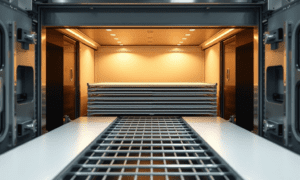Manufacturing project management is a complex field that requires careful coordination of resources, timelines, and stakeholder expectations. With the pressure to deliver high-quality products on time and within budget, project managers in the manufacturing sector face a range of challenges. From managing supply chain disruptions to ensuring efficient resource allocation, these challenges can significantly impact project outcomes. Fortunately, advancements in manufacturing project management software are providing new ways to address these issues effectively. The article explores the key challenges in manufacturing project management and offers strategies to overcome them, highlighting the role of modern software solutions.
1) Supply Chain Disruptions.
Challenge: One of the most pressing challenges in manufacturing project management is managing supply chain disruptions. Factors such as raw material shortages, supplier delays, and transportation issues can lead to significant project delays and increased costs. These disruptions can stem from global events, geopolitical tensions, or unexpected supplier failures, making them difficult to predict and manage effectively. Unfortunately, in a globalized market, these disruptions can be difficult to predict and manage.
Solution: To mitigate supply chain disruptions, manufacturing project managers need to adopt a proactive approach. This includes developing strong relationships with suppliers, diversifying the supplier base, and implementing robust contingency plans. Advanced manufacturing project management software can play a crucial role here. For example, it can perform scenario analysis to find the most reasonable solutions to the existing challenges. It also facilitates flexibility which makes it easier to respond to disruptions.
2) Resource Allocation and Optimization.
Challenge: Efficient allocation of resources (people, equipment, raw materials) is crucial for the success of manufacturing projects. Over-allocation can lead to burnout and delays, while under-allocation can result in inefficiencies and missed deadlines. Balancing these needs requires a detailed understanding of resource availability, project demands, and potential bottlenecks.
Solution: Effective resource management involves balancing the workload across teams and ensuring that resources are used optimally. Manufacturing project management software with AI-driven resource allocation capabilities can assist in this process by analyzing data to predict resource needs, identify bottlenecks, and suggest adjustments. These tools enable project managers to make data-driven decisions, improve resource utilization, and enhance overall project efficiency.
3) Managing Complex Timelines.
Challenge: Manufacturing projects often involve intricate timelines with multiple dependencies. Delays in one phase can cascade and impact the entire project schedule, making it challenging to keep everything on track. Coordinating these complex timelines requires meticulous planning and continuous monitoring to ensure that all tasks are completed on time.
Solution: To manage complex timelines, project managers should implement detailed scheduling practices and use advanced project management tools. Software that offers Gantt charts, critical path analysis, and real-time updates can help in visualizing project timelines, tracking progress, and identifying potential delays. By using these tools, project managers can anticipate scheduling issues and make timely adjustments to keep projects on track.
4) Communication and Collaboration.
Challenge: Effective communication and collaboration are vital for the success of manufacturing projects, especially when teams are spread across different locations or departments. Miscommunication can lead to misunderstandings, errors, and delays.
Solution: To enhance communication and collaboration, manufacturers should invest in project management tools that facilitate seamless interaction between team members. Software solutions with integrated messaging, file sharing, and collaborative workspaces help ensure that all stakeholders are on the same page. By providing a centralized platform for communication, these tools reduce the risk of miscommunication and foster better teamwork.
5) Budget Management.
Challenge: Staying within budget is a common challenge in manufacturing project management. Unexpected expenditures, scope changes, and inefficient resource use can lead to budget overruns. Effective budget management requires continuous monitoring and adjustment to align actual expenses with the planned budget.
Solution: Manufacturing project management software with financial tracking and reporting features can help project managers keep a close eye on expenses and identify potential budget issues early. By using these tools, project managers can track actual costs against the budget, manage changes, and make informed decisions to keep the project within financial constraints.
6) Risk Management.
Challenge: Every manufacturing project comes with its own set of risks, from technical challenges to market fluctuations. Identifying and managing these risks is essential to prevent project failure.
Solution: Risk management involves identifying potential risks, assessing their impact, and implementing mitigation strategies. Manufacturing project management software with risk management features allows project managers to track and analyze risks, develop contingency plans, and monitor risk mitigation efforts. By leveraging these tools, project managers can anticipate and address risks effectively, reducing the likelihood of project disruptions.
7) Change Management.
Challenge: Changes in project scope, requirements, or design can have significant implications for manufacturing projects. Managing these changes effectively is crucial to maintaining project success and ensuring that all modifications are properly evaluated and implemented. What is more, a lack of proper change management can lead to uncontrolled expansion of the project scope which can lead to scope creep and event project failure.
Solution: Implementing a structured change management process helps in handling changes systematically. Project management software with change request and approval features facilitates tracking and managing changes, ensuring that all modifications are documented and assessed for their impact on the project. By using these tools, project managers can manage changes efficiently, minimize disruptions, and keep the project aligned with its objectives.
Conclusion
Manufacturing project management involves navigating a complex landscape of challenges, from supply chain disruptions to resource allocation and quality control. By leveraging advanced manufacturing project management software, organizations can address these challenges more effectively and enhance project outcomes. Modern manufacturing project management tools equipped with features for real-time tracking, resource optimization, and risk management enable project managers to make informed decisions, streamline processes, and achieve greater efficiency. All these capabilities are available in Epicflow multi-project resource management software for the manufacturing industry. It helps manufacturers overcome the hurdles of manufacturing project and resource management and drives successful project execution.



































